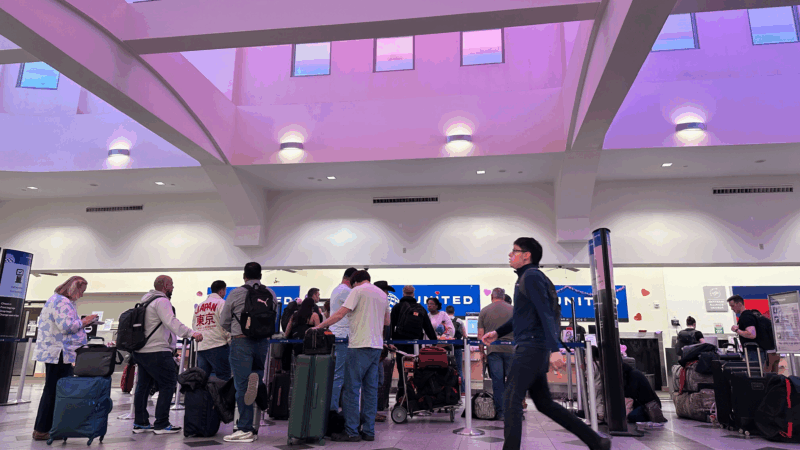CDC pauses remote work arrangements for employees with disabilities, union says
A union representing Centers for Disease Control and Prevention workers is accusing the federal agency of jeopardizing accommodations for its disabled employees by ending remote work.
In January, the Office of Personnel Management said federal employees would have to return to the office full-time, with the exception of those “excused due to a disability, qualifying medical condition, or other compelling reason certified by the agency head and the employee’s supervisor.”
Then, last month, the Department of Health and Human Services, the parent agency of the CDC, released an updated telework policy that does not include telework as a reasonable accommodation.
Members of the American Federation of Government Employees (AFGE), a union representing over 800,000 federal employees across the U.S., say that the revised policy’s lack of clarity around remote work has stoked confusion among staff members with remote-work arrangements as well as their supervisors.
Yolanda Jacobs, president of AFGE Local 2883, told NPR on Wednesday that some of CDC’s disabled employees are waiting for an answer on whether working offsite remains a reasonable accommodation.
“If there’s any discussions happening, it’s happening between the CDC’s leadership and HHS, it’s not happening with the employees,” she said. “Employees are finding out secondhand and last minute.”
The HHS and CDC were not immediately available for comment.
NPR has obtained a copy of a memo with CDC branding from a person who was not authorized to release it. The memo, dated Sept. 16., says the new telework policy no longer includes telework as a reasonable accommodation available to employees. The CDC, it said, will defer to the HHS on how to proceed with disabled employees’ telework accommodations, and that, “until additional clarification is received,” approvals for any pending requests for remote work accommodations would be “paused until further notice.”
According to the memo, the new telework policy took effect on Aug. 13.
The CDC has not responded to a request to comment on the memo.
“Instead of waiting on guidance from HHS, [the CDC has] decided to move forward on their own interpretation of what reasonable accommodations should look like,” Jacobs said.
Another source familiar with the matter said Wednesday that the union has received about 250 emails from disabled employees at the CDC’s Atlanta headquarters who are concerned about losing their telework arrangements. They include, for example, workers who use wheelchairs or who require caretakers. The source said the CDC has not provided official figures on how many disabled employees have telework as a reasonable accommodation in their roles.
Employees can still work remotely until their current telework arrangements expire, according to the memo. Jacobs told NPR the union has been directing its members to resources to take legal action if they choose.
The confusion comes at a tumultuous time for the agency. CDC was shaken up last month after HHS Secretary Robert F. Kennedy Jr. fired Susan Monarez less than a month into her role as director. Several top leaders in the agency resigned shortly after, including infectious disease physician Demetre Daskalakis. Monarez testified before the Senate on Wednesday that she was fired for not giving into Kennedy’s pressures to fire scientists and pre-approve vaccine recommendations for the public.
House GOP pushes strict proof-of-citizenship requirement for voters
House Republicans rushed to approve legislation on Wednesday that would impose new proof-of-citizenship requirements ahead of the midterm elections, a Trump administration priority that faces blowback in the Senate.
In blunt warning, the U.S. says Peru could lose its sovereignty to China
The Trump administration on Wednesday expressed concern that China was costing Peru its sovereignty after a Peruvian court ruling restricted a local regulator's oversight of a Chinese-built mega port.
U.S. ice dancers Madison Chock and Evan Bates win Olympic silver, in a stunning upset
Chock and Bates, four-time Olympians, were heavily favored for gold. But they lost by less than two points to a French duo who has been clouded by controversy involving their former partners.
AI brings Supreme Court decisions to life
Like it or not, the justices are about to see AI versions of themselves, speaking words that they spoke in court but that were not heard contemporaneously by anyone except those in the courtroom.
These monks’ walk for peace captivated Americans. It ends this week
A group of Buddhist monks walked from Fort Worth, Texas, to Washington, D.C., in the name of peace. The 108-day pilgrimage captivated Americans.
The airspace around El Paso is open again. Why it closed is in dispute
The Federal Aviation Administration abruptly closed the airspace around El Paso, only to reopen it hours later. The bizarre episode pointed to a lack of coordination between the FAA and the Pentagon.





